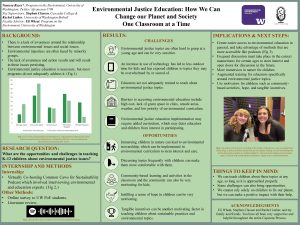ENVIRONMENTAL JUSTICE EDUCATION: HOW WE CAN CHANGE OUR PLANET AND SOCIETY ONE CLASSROOM AT A TIME
Social justice issues are prominent in our society, as are environmental issues. These topics are often connected and frequently overlooked. There is a lack of availability of education and awareness surrounding these topics, and they are difficult to explain to young children. The purpose of this study was to find the challenges and opportunities within teaching K-12-aged children about environmental justice issues. To accomplish this task, I conducted interviews with environmental and education experts as a podcast co-host for the Common Caws for Sustainability Podcast, surrounding interview subjects and questions of environmental education and justice. I also collected evidence through a literature review and an online survey given to University of Washington students in the Program on the Environment. There are several challenges that appear when educating children about environmental justice issues, including sensitivity and complexity of topics, societal institutions that do not prioritize eco-justice pedagogy, and a general lack of access to environmental education. However, these challenges can be overcome using several different opportunistic approaches or a combination of them, including immersing children in nature, community-based activities such as a neighborhood trash pick-up, and tangible incentives like treats or extra play time. Educating children about the environment and our society is critical for fostering a generation that is accepting of diversity and inclusion and supports environmental stewardship. By doing so, we can aim toward a more promising future for our planet and disproportionately impacted communities.
